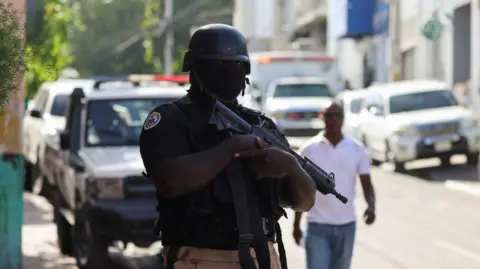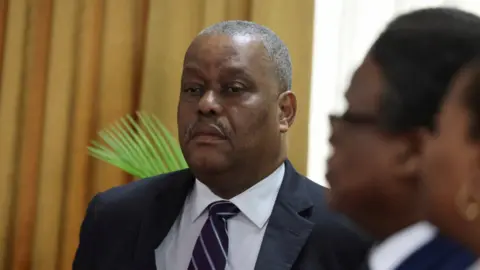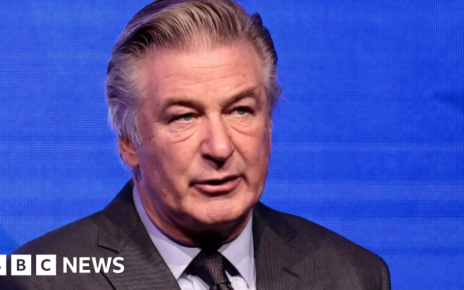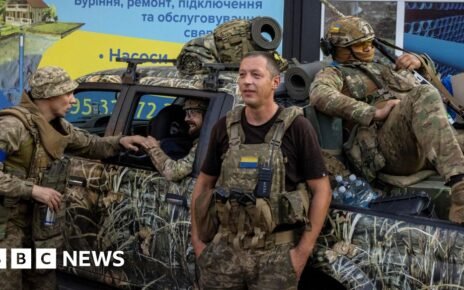[ad_1]
By Will Grant, Mexico and Central America correspondent • George Wright, BBC News
 Reuters
ReutersA new government has been formed in Haiti as it tries to restore order in the violence-ravaged nation.
The new cabinet completely replaces all the ministers from the government of the former Prime Minister, Ariel Henry, who was forced to step down earlier this year by gangs which control large parts of Haiti.
The announcement of the new cabinet comes two weeks after the country’s transitional government council appointed Garry Conille as interim prime minister.
He will also take on the role of interior minister, according to the decree, published in Haiti’s official gazette.
The formation of a cabinet in Haiti is a further sign of efforts to bring back some political stability to a nation wracked by violence and uncertainty for many months.
The transitional council appointed people to all the key cabinet positions and their ministers, a spokeswoman confirmed.
 Reuters
ReutersMr Conille’s attorney, Carlos Hercules, will be the minister for justice and public security and Haiti’s ambassador to Unesco, Dominique Dupuy, will be the foreign affairs minister.
Princeton-educated Ketleen Florestal takes over the finance ministry from Michel Patrick Boisvert, who also served as interim prime minister this year.
While some Haitians will be encouraged by these first steps towards normalcy, especially after the recent re-opening of the country’s international airport, others remain deeply worried about the scale of the task in front of the new cabinet.
Gangs still control most of the capital, Port-au-Prince, and gang leaders refuse to recognise the legitimacy of the interim council or any of the transitional leadership.
Last year a UN-backed security force, to be led by Kenya, was promised as a boost to struggling Haitian police, but it has not yet been deployed.
A planned deployment of around 1,000 Kenyan police officers to try to restore order is still yet to materialise although Kenyan President William Ruto did reiterate his support for the plan in an interview with the BBC last month.
Mr Henry agreed to step down in March after armed groups blocked his return to the country from Kenya, where he had gone for talks with President Ruto.
Gangs capitalised on the power vacuum left by the prime minister’s exit and expanded their control over swathes of the country, which has effectively become lawless in places.
The situation in Haiti was described as “cataclysmic” by the United Nations in a report published last month.
It said more than 1,500 people had been killed and 800 injured in the first three months of 2024.
The report detailed the “harrowing practices” of the gangs, which are accused of using extreme violence and sexual abuse as a means of punishment and control.
Aid groups have reported difficulties in getting food and water into the capital, warning that millions are unable to find sustenance – with some on the verge of famine.
Haiti’s problems worsened after the presidential assassination of Jovenel Moïse in 2021 threw the nation into upheaval. Gangs have expanded their control over the country while displacing thousands of civilians.
The country has had no president since the assassination and it has no sitting parliament.
Haiti: The basics
- The Caribbean country shares a border with the Dominican Republic and has an estimated population of 11.5 million
- It has a land area of 27,800 sq km, which is slightly smaller than Belgium and about the same size as the US state of Maryland
- Chronic instability, dictatorships and natural disasters in recent decades have left Haiti the poorest nation in the Americas
- An earthquake in 2010 killed more than 200,000 people and caused extensive damage to infrastructure and the economy
- A UN peacekeeping force was put in place in 2004 to help stabilise the country and only withdrew in 2017
- In July 2021, President Jovenel Moïse was assassinated by unidentified gunmen in Port-au-Prince. Amid political stalemate, the country continues to be wracked by unrest and gang violence
[ad_2]
Source link




